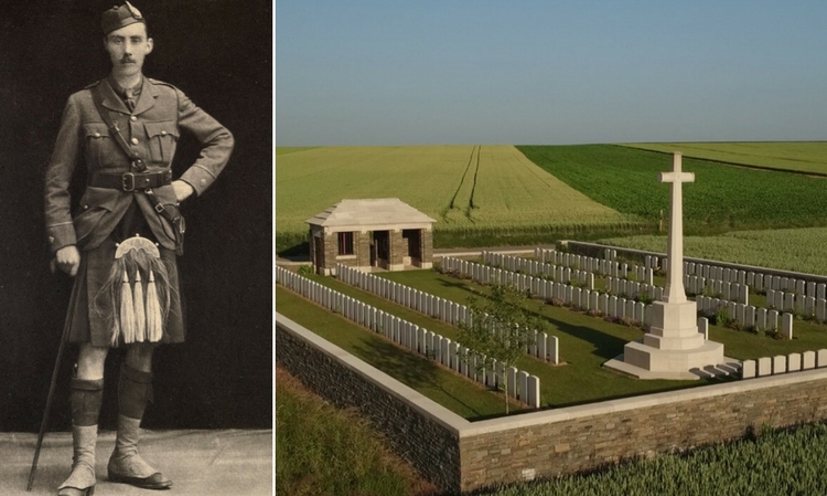21 November 2017
Casualties of Cambrai: Lieutenant Ewart Alan Mackintosh
Today marks 100 years since Lieutenant Ewart Alan Mackintosh was killed during the Battle of Cambrai. Here is more about the war poet.

Lieutenant Ewart Alan Mackintosh
1st/5th Seaforth Highlanders
Died: 21 November 1917
Buried in: CWGC Orival Wood Cemetery
Ewart was the son of Alexander Mackintosh, from Inverness-shire. He was born in Brighton, and attended Brighton College. He later attended St. Paul’s in London, where he edited the school magazine, The Pauline. He was a gifted wordsmith, writing many poems, and won a scholarship to Oxford University.
At university his interest in all things Scottish grew. He made numerous trips to the Highlands, learning Gaelic and to play the bagpipes.
When war broke out and many of his Oxford contemporaries joined the army, Mackintosh was rejected because of poor eyesight. He joined the university Officer Training Corps, and was eventually accepted by the 1st/5th Seaforth Highlanders at the end of 1914. He served in France from July 1915, and was appointed as the battalion bombing officer.
In March 1916, the 51st (Highland) Division took over a sector north of Arras previously held by the French, where the opposing trenches were close together. In May, Mackintosh led a successful raid on a German trench, during which some of his men were badly wounded. Despite heroic attempts to carry them to safety, they both died.
He received the Military Cross for his action, though he wrote he would ‘rather have the boys’ lives’.
An extract from The London Gazette recorded: "For conspicuous gallantry. He organised and led a successful raid on the enemy's trenches with great skill and courage. Several of the enemy were disposed of and a strong point destroyed. He also brought back two wounded men under heavy fire.”
It also inspired his best-known poem, ‘In Memoriam’. Here is an extract:
Oh, never will I forget you,
My men that trusted me,
More my sons than your fathers’,
For they could only see
The little helpless babies
And the young men in their pride.
They could not see you dying,
And hold you while you died.
Happy and young and gallant,
They saw their first-born go,
But not the strong limbs broken
And the beautiful men brought low,
The piteous writhing bodies,
The screamed ‘Don’t leave me, Sir’,
For they were only your fathers
But I was your officer.
Ewart was wounded during the Battle of the Somme in 1916, and sent back to England. After he had recovered, he spent eight months at Cambridge training cadets in the use of bombs, and while there got engaged to a Voluntary Aid Detachment nurse, Sylvia Marsh.
At the beginning of October 1917 he returned to France and took part in the Battle of Cambrai. Ewart was killed on 21 November, the second day of the battle, and is buried at CWGC Orival Wood Cemetery.

